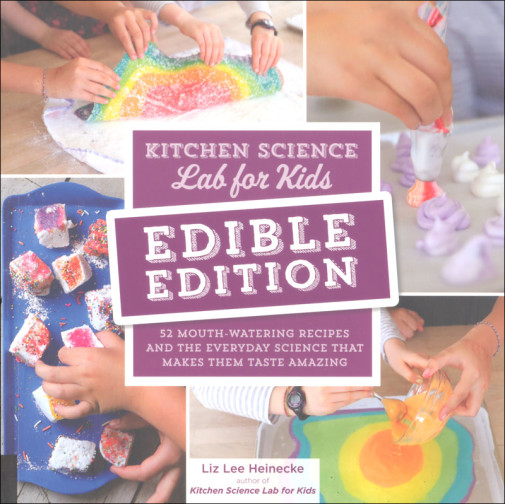We use cookies to make your experience better. To comply with the new e-Privacy directive, we need to ask for your consent to set the cookies. Learn more.
Kitchen Science Lab For Kids: Edible Edition
Why just create kitchen concoctions when you can whip up a delectable dish to enjoy with friends or family? Divided into eight courses (chapters), each course offers an array of recipes with ingredients and supply lists, step-by-step instructions, safety tips and hints, and an explanation of the science behind the food. Each recipe also identifies the challenge level, allergen alerts, time needed, and yield. Dazzling drinks, snacks, dips and sauces, main dishes, sides, pastries, desserts, and more are included. A great way to apply scientific principles to everyday life and maybe entice a picky eater to expand his/her palette! ~Deanne
Kitchen Science Lab for Kids: EDIBLE EDITION gives you 52 delicious ways to explore food science in your own kitchen by making everything from healthy homemade snacks to scrumptious main dishes and mind-boggling desserts.
When you step into your kitchen to cook or bake, you put science to work. Physics and chemistry come into play each time you simmer, steam, bake, freeze, boil, puree, saute, or ferment food. Knowing something about the physics, biology, and chemistry of food will give you the basic tools to be the best chef you can be.
Bodacious Bubble Tea, Flavorful Fruit Leather, Super Spring Rolls, Mouthwatering Meatballs…divided by course, each lab presents a step-by-step recipe for a delicious drink, snack, sauce, main dish, dessert, or decoration. The Science Behind the Food section included with each recipe will help you understand the science concepts and nutrition behind the ingredients. Have fun learning about:
* Bacteria and the chemical process of fermentation by making your own pickled vegetables.
* Emulsion as you create your own vinaigrette.
* How trapped water vapor causes a popover to inflate as you make your own.
* Crystals by making your own ice cream.
Mix and match the recipes to pair pasta with your favorite sauce, make ice cream to serve in homemade chocolate bowls, or whip up the perfect frosting for your cake. There are plenty of fun, edible decorations included for the art lovers in the crowd. Before long, you'll have the confidence to throw together a feast, bake and decorate show-worthy cakes, or use what you've learned to create your own recipes.
For those with food allergies, all recipes are nut-free and other allergens are clearly labeled throughout.
Let's get cooking—and learning!
Take their science curiosity to the next level with Labs for Kids! Each book in the series offers interactive activities for multiple age ranges that use affordable, easily found items. A great way for families to have fun learning together! See individual titles for more information. ~Deanne
| Product Format: | Paperback |
|---|---|
| Brand: | Quarry Books |
| Author: | Liz Lee Heinecke |
| Grades: | 3-7 |
| ISBN: | 9781631597411 |
| Length in Inches: | 8.5 |
| Width in Inches: | 8.5 |
| Height in Inches: | 0.4375 |
| Weight in Pounds: | 1 |

